The "best" time to take protein powder depends on your individual goals and circumstances.
The composition of protein powder directly relates to the optimal timing for consuming it because of their different digestion and absorption rates. Here's how:
- Whey protein: Digests and absorbs very quickly (30-60 minutes), making it ideal for post-workout recovery when your muscles need a fast influx of amino acids for repair and growth. This aligns with the traditional "anabolic window" concept.
- Casein protein: Digests and absorbs slowly (over several hours), providing a sustained release of amino acids. This makes it good for satiety, bedtime protein intake, or when you know you won't have another protein source for a while.
- Blends: Combine whey and casein, offering a mixed absorption rate, which can be suitable for various situations depending on your goals.
- Other options: Plant-based proteins like pea or soy can have varying absorption rates depending on the source and processing. Research their specific characteristics.
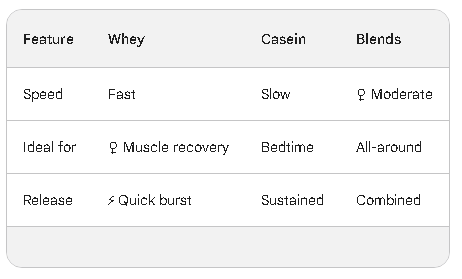
Post-Workout Window
The optimal timing for protein intake after a workout to enhance muscle protein synthesis (MPS) and recovery is a topic of ongoing research and debate, with no definitive answer.
MPS is a fancy way of saying the building process of new muscle tissue. It's a crucial process for overall health and fitness, especially if you're trying to build muscle mass, recover from exercise, or maintain healthy muscle function as you age.
Here's a breakdown of the current understanding:
Arguments for consuming protein within 30 minutes to an hour:
- Increased Amino Acid Availability: This timeframe coincides with the period of peak muscle protein breakdown after exercise, when your body is most receptive to amino acids for repair and growth. Consuming protein during this window ensures a readily available supply for MPS.
- Faster Absorption: Certain protein sources, like whey, are rapidly absorbed, delivering amino acids to your muscles quickly. This can be beneficial for maximizing MPS in the immediate post-workout period.
- Improved Recovery: Studies suggest that protein intake shortly after exercise may reduce muscle soreness and fatigue, promoting faster recovery and readiness for subsequent workouts.
Arguments against strict adherence to a 30-minute window:
- Total Daily Protein Intake: Recent research suggests that total daily protein intake might be more important than the specific timing around workouts. As long as you meet your daily protein needs, consuming it throughout the day, including after your workout, may be sufficient for optimal MPS.
- Individual Responses: Some individuals may respond better to different protein intake timings. Factors like training type, intensity, and dietary habits can influence individual needs.
- Alternative Protein Sources: Slower-digesting protein sources like casein may offer sustained amino acid release over a longer period, potentially extending the window for MPS beyond the immediate post-workout period.
Recommendations:
- Consume enough protein throughout the day: Aim for 0.8-1 gram of protein per kilogram of body weight per day, adjusting based on your individual needs and goals.
- Consider consuming protein after your workout: This can be beneficial for maximizing amino acid availability and promoting recovery.
- Don't stress about the exact timing: As long as you're meeting your daily protein needs and consuming some protein after your workout, the specific timing within the 30-minute window may not be critical for everyone.
- Listen to your body: Pay attention to how you feel and adjust your protein intake and timing accordingly.
Daily intake examples:
The recommendation to aim for 0.8-1 gram of protein per kilogram of body weight per day is a good starting point, but it's important to adjust based on your individual needs and goals. Here are some examples to illustrate this:
Example 1: Sedentary adult with no specific protein goals:
- Weight: 132.3 lbs (60 kg)
- Protein intake: 0.36 oz/lb (0.8 g/kg) * 132.3 lbs = 1.69 oz (48 grams per day)
- Explanation: This person would likely achieve their minimum protein requirements by consuming around 1.69 oz (48 grams) per day. However, they may still benefit from increasing their intake slightly, especially if they are active or trying to maintain muscle mass.
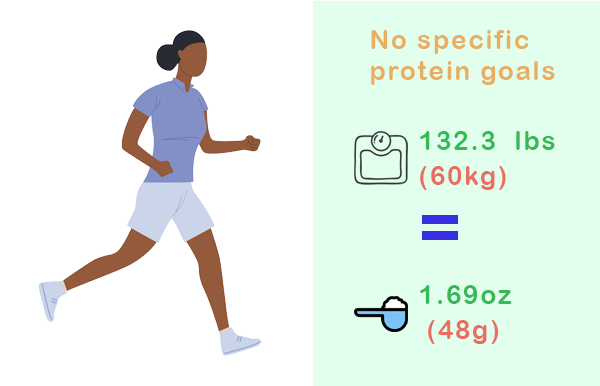
Example 2: Active adult trying to build muscle:
- Weight: 165.3 lbs (75 kg)
- Protein intake: 0.54-0.72 oz/lb (1.2-1.6 g/kg) * 165.3 lbs = 4.03-5.10 oz (90-120 grams per day)
- Explanation: Since this person is actively trying to build muscle, they may need a higher protein intake to support muscle growth and repair. Aiming for 0.54-0.72 oz/lb (1.2-1.6 grams) per kilogram of body weight would be a good range for them.
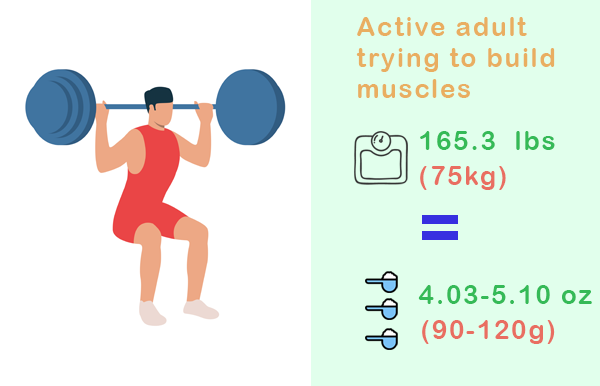
Example 3: Older adult with concerns about muscle loss:
- Weight: 121.3 lbs (55 kg)
- Protein intake: 0.44-0.54 oz/lb (1-1.2 g/kg) * 121.3 lbs = oz (55-66 grams per day)
- Explanation: As we age, our bodies become less efficient at using protein. Older adults may therefore benefit from consuming slightly more protein than younger adults, especially if they are concerned about muscle loss.
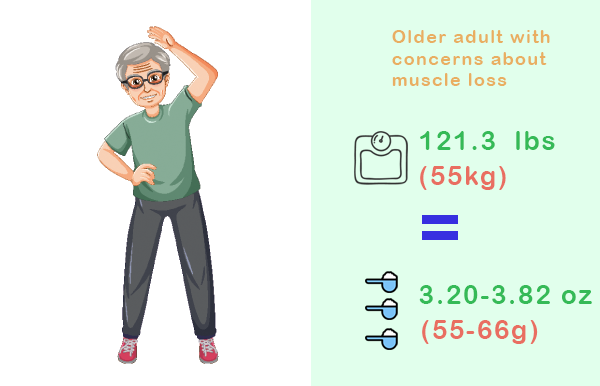
Pre-Workout Boost
While the optimal timing for protein intake post-workout is still debated, evidence from some studies does suggest that consuming protein before a workout may also be beneficial for MPS. Here's why:
Increased Amino Acid Availability:
- Pre-workout protein boosts blood amino acid levels, providing a readily available pool for your muscles to utilize during exercise. This can prime the pump for MPS even before you start breaking down muscle tissue.
- Studies demonstrate that pre-workout protein can elevate amino acid levels for up to 2 hours, potentially extending the window for enhanced MPS during and after your workout.
MPS Benefits:
- Research suggests that pre-workout protein can lead to greater MPS compared to just consuming protein after exercise. This effect may be particularly pronounced for individuals with higher training intensity or protein needs.
- Some studies point to reduced muscle breakdown with pre-workout protein, further promoting net muscle protein gain and potentially accelerating recovery.
Throughout the Day
Distributing your protein intake throughout the day is a fantastic way to maximize its benefits for muscle repair and growth. Here are some recommendations:
- Aim for the recommended daily protein intake, which is around 0.8 grams per kilogram of body weight. Athletes or individuals with higher protein needs may require more.
- Consider distributing your protein intake throughout the day, aiming for 20-30 grams of protein per meal or snack.
- Listen to your body and adjust your protein intake and timing based on your individual needs and preferences.
- If you're struggling to meet your protein needs through food alone, consider using protein supplements like protein powder or shakes. However, it's always best to prioritize protein from whole food sources first.
Morning Routine
For individuals aiming to increase their protein intake and if their current breakfast lacks sufficient protein, having a protein shake or smoothie in the morning can be a beneficial strategy, but it's not the only option. Here's a breakdown of the pros and cons:
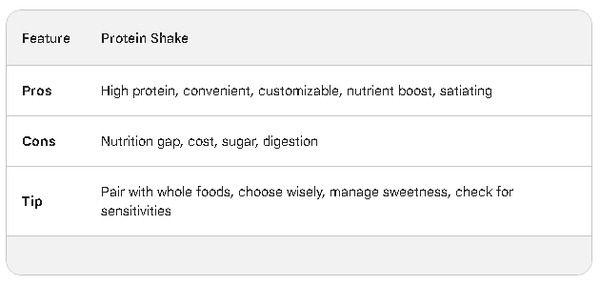
Pros of a morning protein shake:
- High protein content: Protein powders readily provide a concentrated dose of protein, helping you reach your daily protein goals more easily.
- Convenience: Protein shakes are quick and easy to make, ideal for busy mornings. If you're interested, check this page for Vega protein smoothies recipes.
- Customizable: You can adjust the protein content and flavours to your preferences by adding fruits, vegetables, spices, or other ingredients.
- Nutrient boost: Some protein powders are fortified with additional vitamins and minerals, further enhancing the nutritional value of your breakfast.
- Reduced cravings: Protein tends to be more satiating than other macronutrients, potentially keeping you fuller for longer and helping to control cravings throughout the morning.
Cons of a morning protein shake:
- Nutritional gap: Protein shakes may not offer the same micronutrient and fibre content as whole-food breakfasts. Consider pairing your shake with fruits, vegetables, or whole grains for a more balanced meal.
- Cost: High-quality protein powders can be expensive compared to some whole-food protein sources.
- Sugar content: Be mindful of added sugars in some protein powders. Choose unsweetened varieties or control the sweetness with natural alternatives like fruits.
- Potential digestive issues: Some people may experience digestive discomfort with protein shakes, particularly if they have lactose intolerance or are sensitive to certain ingredients.
Alternative strategies for increasing protein intake at breakfast:
- Include protein-rich whole foods: Eggs, Greek yogurt, cottage cheese, tofu, tempeh, nuts, seeds, and lean meats are all excellent sources of protein.
- Boost your oatmeal: Add protein powder, nuts, seeds, or nut butter to your oatmeal for a protein-packed breakfast.
- Make a protein smoothie: Blend protein powder with fruits, vegetables, and yogurt for a delicious and nutritious smoothie.
- Choose protein-rich breakfast cereals: Look for cereals with at least 5 grams of protein per serving.
if you like muffins or cookies, make sure to check these 8 recipes for baking with protein powder.
Before Bed
There is growing evidence to suggest that consuming protein before bedtime can offer a sustained release of amino acids throughout the night, potentially supporting MPS during sleep. Here's a breakdown of the current understanding:
Supporting Arguments:
- Slow-digesting protein: Certain types of protein, like casein, digest and absorb slowly, providing a gradual release of amino acids over several hours. This sustained supply can counteract muscle breakdown and stimulate MPS throughout the night.
- Elevated growth hormone: Growth hormone levels naturally rise during sleep, promoting muscle growth and repair. Studies suggest that pre-sleep protein intake can further amplify this effect, leading to greater MPS.
- Improved recovery: Adequate protein intake before bedtime may reduce muscle soreness and fatigue following workouts, contributing to faster recovery and increased readiness for subsequent training sessions.
- Research findings: Several studies have shown that consuming protein before sleep, particularly casein, can increase MPS rates compared to a placebo or no protein at all, especially in individuals who engage in resistance training.
Important Considerations:
- Total protein intake matters: While pre-sleep protein can be beneficial, it's not a magic bullet. Meeting your overall daily protein needs (around 0.8-1 grams per kilogram of body weight) remains crucial for optimal muscle health and growth.
- Individual responses: People may vary in their response to pre-sleep protein based on factors like training intensity, dietary habits, and genetic disposition.
- Sleep quality matters: Poor sleep can hinder muscle growth and negate the benefits of pre-sleep protein. Prioritizing healthy sleep hygiene remains essential for optimizing muscle recovery and performance.
Meal Replacement
While protein powder can be a convenient and effective way to boost your protein intake and potentially aid in meeting your daily requirements, it's not always an ideal complete meal replacement, particularly in situations where whole food options are unavailable or inconvenient. Here's a breakdown of the pros and cons:
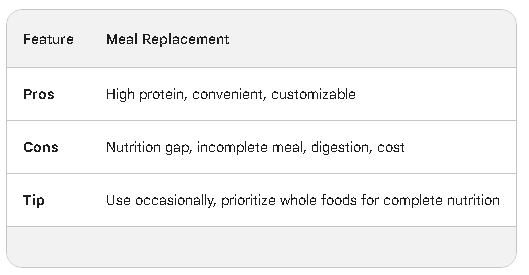
Pros of using protein powder for meal replacement:
- High protein content: Protein powders provide a concentrated source of protein, helping you reach your daily protein goals easily.
- Convenience: Protein shakes are quick and easy to make, ideal for busy schedules or travel.
- Customization: You can tailor your protein shakes to your preferences by adding fruits, vegetables, spices, or other ingredients.
- Nutrient boost: Some protein powders are fortified with additional vitamins and minerals, offering some nutritional value.
Cons of using protein powder for meal replacement:
- Nutritional gap: Protein shakes typically lack the fibre, vitamins, minerals, antioxidants, and other essential nutrients found in whole foods. This can lead to nutrient deficiencies if used as a regular meal replacement.
- Incomplete meal: Protein alone is not enough to sustain overall health. Missing out on other macronutrients like carbohydrates and healthy fats can impact energy levels, satiety, and overall health.
- Potential digestive issues: Some people may experience bloating, gas, or other digestive problems, especially with whey protein or artificial sweeteners.
- Cost: High-quality protein powders can be expensive compared to whole-food protein sources.
Recovery after Injury or Illness
Protein powder can indeed be a convenient and helpful supplement for increasing protein intake during periods of injury or illness when the body requires additional protein for healing and recovery. Here's a breakdown of why:
Benefits of protein powder during injury or illness:
- Increased protein needs: During these periods, the body's protein needs usually increase to support tissue repair and immune function. Protein powder offers a concentrated source of easily digestible protein to help meet these elevated needs.
- Convenience: Especially during illness or recovery, preparing elaborate meals can be challenging. Protein shakes are quick and easy to make, ensuring adequate protein intake even with limited energy or appetite.
- Nutrient boost: Certain protein powders are fortified with vitamins and minerals that may be depleted during illness or injury, further supporting overall recovery.
- Improved recovery: Adequate protein intake can contribute to faster wound healing, reduced muscle loss, and enhanced immune function, potentially leading to quicker recovery times.
In Conjunction with Carbohydrates
Combining protein and carbohydrates after intense endurance exercise can be a beneficial strategy for some athletes, particularly those with high training loads or seeking to maximize muscle growth and repair. However, carbohydrates remain the star of the show for glycogen replenishment.
Here's a balanced approach:
- Prioritize carbohydrates: Aim for 1-1.2 g/kg body weight/hour of carbohydrates within the first 30-60 minutes after exercise. Choose easily digestible sources like fruits, sports drinks, or sugary snacks.
- Moderate protein intake: Include 0.2-0.4 g/kg body weight of protein alongside your carbohydrates. Consider whole food sources like yogurt, lean meats, or nuts, or add a moderate serving of protein powder to your post-workout meal/snack.
- Listen to your body: Pay attention to your individual needs and adjust your protein intake accordingly. Consult a registered dietitian for personalized guidance.
Carb + protein intake examples
Here are some examples of aiming for 1-1.2 g/kg body weight/hour of carbohydrates within the first 30-60 minutes after exercise using easily digestible sources:
Example 1: Runner who weighs 154.3 pounds (70 kg) and exercises for 1 hour:
Target carb intake: 1.85 ounces per pound (1.2 g/kg) * 154.3 pounds * 1 hour = 2.96 ounces (84 grams)
Possible options:
- Banana (0.95 oz carbs) + sports drink (1.06 oz carbs) + granola bar (0.88 oz carbs) = 2.89 oz carbs (82g carbs)
- 10.14 oz chocolate milk (36g carbs) + bagel with honey (1.41 oz carbs) = 2.68 oz carbs (76g carbs)
- 7 oz Greek yogurt with berries and granola (0.71 oz carbs) + rice cakes with mashed banana and honey (1.41 oz carbs) = 2.12 oz carbs (60g carbs)
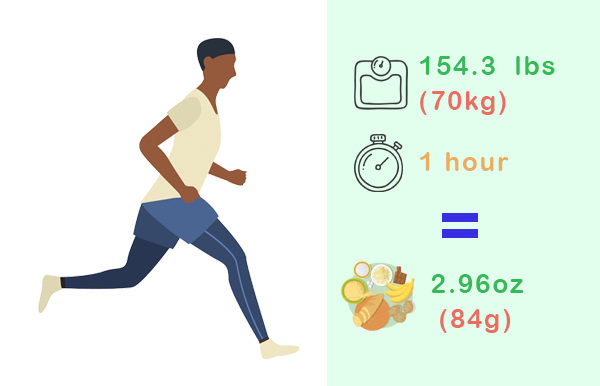
Example 2: Weightlifter who weighs 187.4 lbs (85 kg) and exercises for 45 minutes (0.75 hours):
Target carb intake: 0.44 oz/lb (1 g/kg) * 187.4 lbs * 0.75 hour = 2.26 oz (63.75 grams, rounded up to 64g)
Possible options:
- Smoothie with banana, spinach, and protein powder (1.41 oz carbs) + dates (0.85 oz carbs) = 2.26 oz carbs (64g carbs)
- Toast with mashed avocado and honey (1.06 oz carbs) + orange juice (1.24 oz carbs) = 2.30 oz carbs (65g carbs)
- Rice cakes with almond butter and banana slices (0.99 oz carbs) + sports drink (1.06 oz carbs) = 2.05 oz carbs (58g carbs)
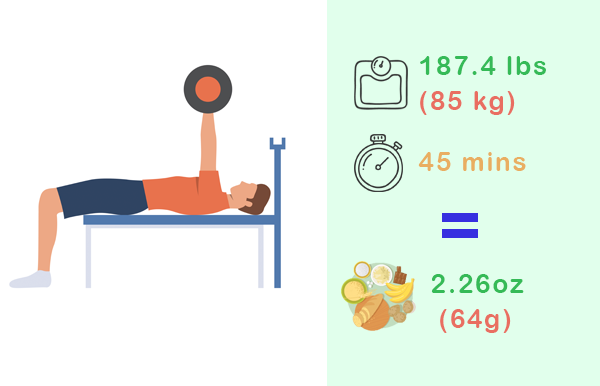
Key takeaways
- Post-workout: Choose whey protein or a whey-dominant blend for a quick amino acid boost.
- Before bed: Opt for casein or a casein-dominant blend for sustained protein release throughout the night.
- Meal replacement or snack: Consider either whey, casein, or a blend depending on your preference for satiety and timing of your next protein intake.
- General protein supplementation: If focusing on total daily protein intake and not specific timing, any type of protein powder can work, but consider absorption rates based on your goals and personal preference.





